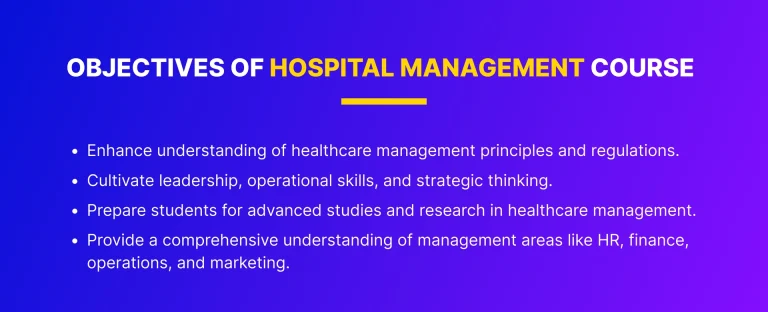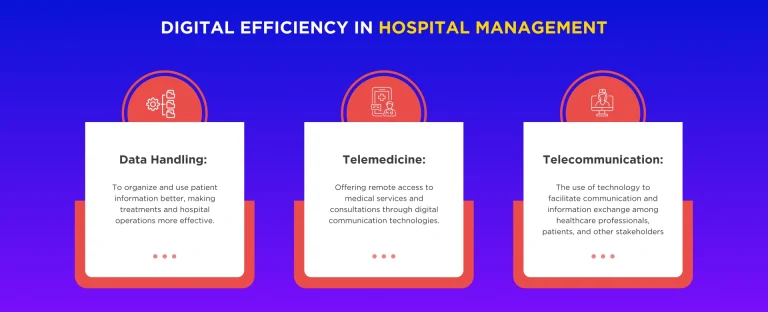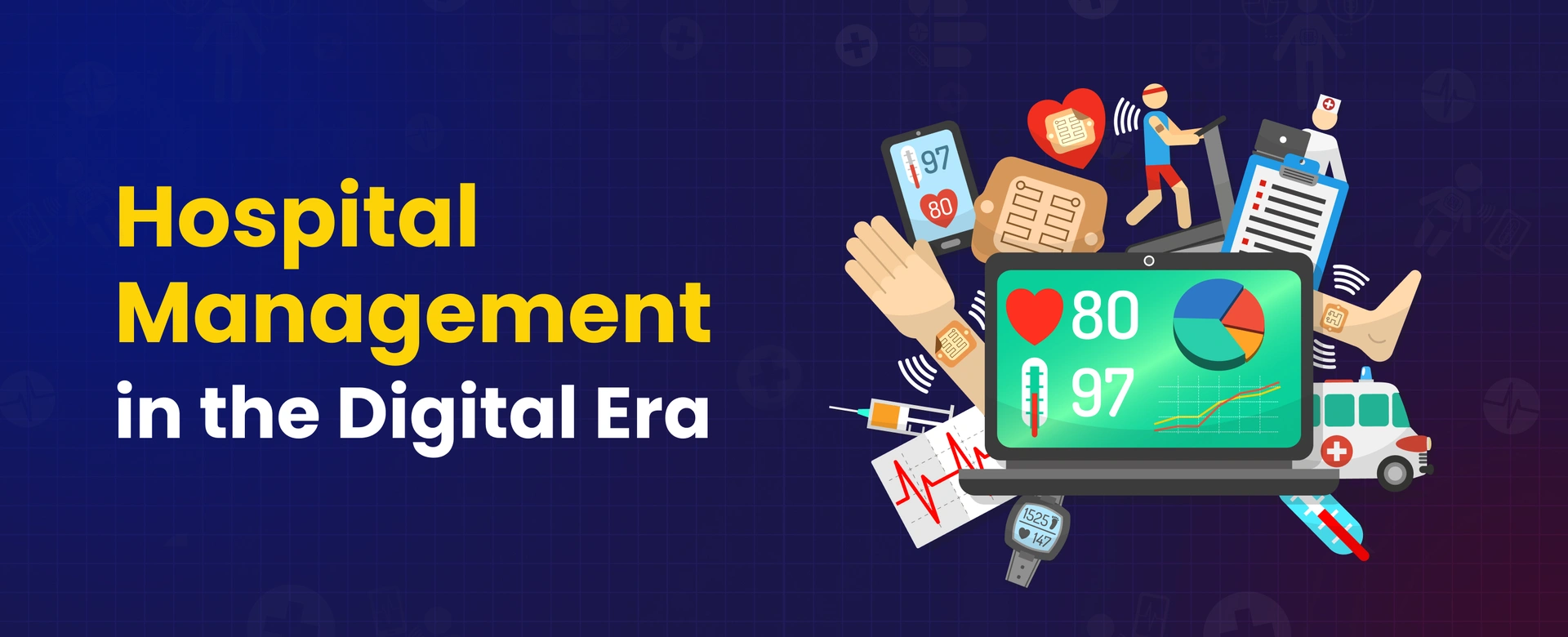Are you from that group of people who think that a BBA in Hospital Management degree will only give you closed career options & desk jobs in hospitals? Then let me enlighten you with the upcoming evolution in the Healthcare Industry which is already opening up different career paths for the degree holders. There is a huge opportunity in the healthcare sector as the World Bank predicts a shortage of 80.2 million workers by 2030 globally.
In the fast-paced world of healthcare, the demand for skilled professionals who can navigate the complexities of hospital management has never been higher. The healthcare industry is no exception to a world where technology is ‘KING’ and things are changing at a rate never seen before. The merging of technology and healthcare has entered in a new period known as the “Digital Era,” in which hospital administration is experiencing a profound upheaval. As technology continues to revolutionize the way we deliver healthcare services, the role of effective leadership in hospitals becomes increasingly vital.
In light of this digital transformation, prospective students must comprehend the value of earning a Bachelor of Business Administration (BBA) in Hospital Management. It is more than just a degree; it is not just a choice, but a pathway to unlocking success in the digital era.
What is Hospital Management?
Hospital Management is an interdisciplinary program that combines business principles with healthcare administration expertise to prepare students for leadership roles in the healthcare industry. Hospital management, also known as healthcare administration or healthcare management, involves planning, directing, and coordinating medical and health services.
Professionals in this field encompass a wide array of responsibilities, all aimed at ensuring healthcare facilities’ smooth and efficient operation. The field of hospital management requires a diverse skill set that includes leadership, communication, financial acumen, healthcare regulations, and technologies.
India’s Hospital and Healthcare Sector: Witnessing tremendous growth
A recent report indicates that the Indian hospital industry will witness a robust Compound Annual Growth Rate (CAGR) of roughly 12 per cent in the next three years. Increase in disposable income in a certain section of the population, easy access to top-grade health facilities, growth of health insurance, an increase in Average Revenue Per Occupied Bed (ARPOB), expanded operational bed capacity, and a reduction in the Average Length of Patient Stays (ALOS) are the reasons fr the positive outlook of the hospital and healthcare sector. In spite of the challenges presented by the pandemic, the industry has maintained healthy operating margins.
The Hospital and Healthcare sector in India consists of hospitals, OPDs, medical apparatus, clinical trials, health insurance, telemedicine, medical tourism, and medical equipment. Traditionally healthcare has largely been a public (government-aided) enterprise as the constitution of Indi guarantees free healthcare for all its citizens.
Following the large-scale economic reforms initiated in 1991, more and more private sector participation was witnessed in the healthcare sector and today the private healthcare industry is responsible for the majority of healthcare in India. Healthcare costs are paid by patients and their families and also by health insurance. India’s boasts of a large reservoir of skilled medical professionals including some of the best doctors and surgeons. At the same time, the price of surgery in India is a fraction of that in the US or Western Europe.
The Prospects in Medical Tourism
As stated medical costs ( including surgery expenses) are a fraction of the costs incurred in Europe and America. At the same time, the standards of treatment and the high efficiency of some of the top private hospitals in India ( such as the Apollo group of hospitals) have proved that the healthcare services in corporate hospitals in India are in no way inferior to the global standards in healthcare and hospital management. Add to the factor the long waiting time in hospitals in the US and England for patients requiring surgeries.
These reasons resulted in a large number of patients from western countries visiting India for treatment. The visit also gives them the scope to tour the country. Hence, the concept of medical tourism gained ground. Today the medical tourism industry in India is worth billion of dollars and growing further.
What is the expertise you will get in BBA-HM?

Financial Management: Will learn to sustain the hospital’s financial health by managing budgets, financial planning, billing, revenue cycle management, and cost control.
Operations Management: Overseeing day-to-day operations such as patient flow, staffing, scheduling, facility maintenance, and ensuring compliance with regulations.
Human Resources Management: Recruiting, hiring, training, and managing healthcare professionals and support staff. This includes ensuring adequate staffing levels and maintaining a positive work environment.
Quality Assurance and Compliance: Implementing quality improvement initiatives, ensuring patient safety, and maintaining compliance with regulatory standards and accreditation requirements.
Strategic Planning: Developing long-term goals, strategies, and initiatives to meet the healthcare needs of the community served by the hospital, as well as adapting to changes in the healthcare landscape.
Information Technology: Managing healthcare information systems, electronic health records (EHR), and other technology infrastructure to support efficient and effective patient care delivery and administrative functions.
Patient Care Management: Ensuring high-quality patient care through effective clinical pathways, patient satisfaction initiatives, and coordination of care among different departments and healthcare providers.
Community Relations: Building and maintaining relationships with patients, families, community organizations, and other stakeholders to promote the hospital’s mission and services.
Where can you stand with this degree?
With a Bachelor of Business Administration (BBA) in Hospital Management, you can pursue several different jobs in the healthcare sector.
Hospital Administrator
Overseeing the day-to-day operations of a hospital or healthcare facility, managing budgets, and staffing, and ensuring efficient delivery of healthcare services.
Healthcare Consultant
Providing advice and expertise to healthcare organizations on business strategies, operational efficiency, regulatory compliance, and healthcare policies.
Health Information Manager
Managing and maintaining patient health records, implementing electronic health record systems, ensuring compliance with privacy regulations (like HIPAA), and analyzing healthcare data for strategic decision-making.
Healthcare Quality Manager
Monitoring and improving the quality of healthcare services provided by a hospital or healthcare organization, implementing quality assurance programs, and ensuring adherence to regulatory standards.
Healthcare Marketing Manager
Developing and implementing marketing strategies to promote healthcare services, managing advertising campaigns, conducting market research, and analyzing consumer behaviour in the healthcare sector.
Medical Practice Manager
Overseeing the administrative and business operations of medical practices, including managing finances, staffing, scheduling, billing, and compliance with healthcare regulations.
Patient Services Manager
Ensuring excellent patient care experiences by managing patient services departments, handling patient inquiries and complaints, overseeing patient satisfaction surveys, and implementing initiatives to improve patient satisfaction.
Healthcare Finance Manager
Managing financial operations within a healthcare organization, including budgeting, financial planning, revenue cycle management, billing, and reimbursement processes.
Health Policy Analyst
Analyzing healthcare policies and regulations, assessing their impact on healthcare organizations, conducting research on healthcare policy issues, and making recommendations for policy changes or improvements.
Healthcare Human Resources Manager
Overseeing human resources functions within healthcare organizations, including recruitment, training, employee relations, performance management, and compliance with labour laws and regulations.
Unlocking New Paths in the Digital-era

In a world evolving at an unprecedented pace, the convergence of healthcare and technology has birthed a new era – the Digital Era – where the landscape of hospital management is undergoing a remarkable transformation. In this paramount digital revolution, Let’s explore the three main components – data processing, telemedicine, and communication – that characterize hospital administration.
Experts in Telecommunication and digital market: Bridging Gaps, Connecting Worlds
In the linked world of today, communication is the cornerstone of contemporary hospital administration. As a writer, deeply entrenched in college-level discourse, it’s fascinating to explore how the intersection of healthcare and digital marketing has transformed patient engagement, streamlined operations, and elevated the standard of care.
The days when individuals had to see certain professionals to receive basic medical advice or to have an ambulance’s contact information are long gone. Healthcare workers may now cooperate, advise, and coordinate treatment more than ever before because of their capacity to communicate quickly and easily over great distances. Understanding communication fundamentals is critical for those who want to pursue careers in hospital administration.
Today, digital marketing serves as a powerful tool for establishing meaningful connections with patients, caregivers, and the community at large. From social media campaigns to personalized email newsletters, hospitals are leveraging various digital channels to disseminate crucial information, promote health awareness, and foster patient trust. Consider the implications of being able to instantly share vital patient information with anyone, anywhere in the world. This skill is essential for saving lives and improving the effectiveness of healthcare delivery.
Telecommunication is the cornerstone of efficient operations and better patient outcomes, whether it is used to coordinate emergency responses, consult experts worldwide, or just make sure hospital personnel are communicating effectively.
More than half of the population spends an average of almost 8 hours a day in the digital world; learning about telecommunication in the healthcare industry is essential for healthcare professionals and organizations to leverage technology effectively, improve access to care, enhance communication and collaboration, and ultimately, deliver better patient outcomes.
Several telecommunication companies in India have ventured into the health sector, leveraging their technological expertise to provide innovative solutions. Search engine optimization (SEO) became paramount in ensuring that hospitals appeared prominently in online searches, driving traffic to their websites and increasing visibility within their target demographics. The large population of India always elevates the demand graph of healthcare facilities, as a result, many well-known companies like Reliance Jio, TCS, Airtel, etc. are opening more opportunities for the upcoming generation of healthcare.
Telemedicine: Redefining Healthcare Delivery
Telemedicine refers to the remote diagnosis and treatment of patients through telecommunications technology, typically video conferencing, phone calls, or secure messaging platforms. It allows healthcare professionals to evaluate, diagnose, and treat patients without the need for an in-person visit, overcoming geographical barriers and improving access to healthcare services.
Telemedicine has gained significant traction, especially in recent years, due to advancements in technology and the increasing demand for convenient healthcare options.
In the Digital Era, telemedicine emerges as a revolutionary force, redefining the very essence of healthcare delivery. As students venturing into the realm of hospital management, understanding the dynamics of telemedicine is not just advantageous but imperative. Telemedicine empowers healthcare providers to extend their reach beyond the confines of traditional brick-and-mortar facilities, offering remote consultations, monitoring, and even treatment.
The ability to leverage telemedicine not only enhances accessibility to healthcare services but also fosters a patient-centric approach. Students equipped with knowledge in hospital management are poised to navigate this landscape, facilitating the integration of telemedicine solutions into existing healthcare frameworks. By embracing telemedicine, hospitals can cater to a broader patient base, optimize resource utilization, and ultimately elevate the standard of care.
Different companies already adopted the idea and started embracing it as a brand. A mid-career Telemedicine Consultant with 4-6 years of experience earns an average salary of ₹7-9 Lakhs per year. Companies like Practo, DocOnline, Lybrate, Apollo Health, Mfine, Netmeds, Zoylo DigiHealth, Vidmed, etc. opened newer aspects of job opportunities for students with tech-savvy. As technology continues to evolve, telemedicine is likely to play an increasingly prominent role in the future of healthcare delivery.
Data Handling: The Currency of the Digital Age
In this digital decade, we already carry our important documents from certificates to licenses in digital apps like Digilocker. In an era characterized by the proliferation of data, effective handling and utilization of information emerge as pivotal components of modern hospital management. Many organizations are promoting free courses for these just to keep up the pace with the evolution.
From electronic health records to real-time analytics, data serves as the lifeblood that fuels informed decision-making and drives operational efficiency. In many other countries like Germany, there has been a growing interest in utilizing automatically generated health data for various purposes within the healthcare system.
Automatically generated health data (AGHD) refers to information collected passively from sources such as medical devices, wearables, sensors, electronic health records (EHRs), and other digital health tools. This data can provide valuable insights into patients’ health status, behaviours, and treatment outcomes.
By continuously monitoring health metrics and trends, AGHD enables early detection of health issues and potential complications, allowing for timely intervention and preventive measures. This can help prevent disease progression and reduce healthcare costs associated with advanced treatments.
For students embarking on a journey in hospital management, mastering the art of data handling is non-negotiable. Harnessing data insights empowers healthcare organizations to identify trends, anticipate patient needs, and optimize resource allocation. Moreover, in an age where data privacy and security are paramount concerns, possessing proficiency in data handling ensures compliance with regulatory standards and safeguards patient confidentiality.
By honing skills in data analytics, students not only enhance their employability but also contribute to the advancement of healthcare delivery in the Digital Era.
Upcoming Evolution of the Healthcare System over the Digital-era:
- Healthcare IT Specialists
- Telecommunication Engineers
- Product Managers/Product Developers
- Regulatory Compliance Specialists
- Customer Support and Training Specialists
- Business Development and Sales Executives
- Research and Development (R&D) Specialists
- Remote Patient Care
- Efficient Communication
- Health Information Exchange
- Remote Monitoring and Management
- Disaster Response and Emergency Care
- Patient Convenience and Satisfaction
- Telemedicine Service Assistance
- Associate with NGOs
- Electronic Health Records (EHRs)
- Data Security and Privacy Regulations
Walk on the success path by embracing change and seizing opportunities
As students contemplating the pursuit of a BBA in Hospital Management, the landscape may seem daunting, yet brimming with boundless opportunities. There is a huge opportunity in the healthcare sector as the World Bank predicts a shortage of 80.2 million workers by 2030 globally. The Digital Era heralds a paradigm shift, wherein traditional norms are challenged, and innovation thrives. It is within this dynamic environment that the significance of hospital management, steeped in technology and driven by innovation, becomes abundantly clear.
By embracing telecommunication, telemedicine, and data handling as pillars of modern hospital management, students position themselves at the forefront of change. They become catalysts for transformation, navigating the complexities of the Digital Era with agility and foresight. With each challenge comes an opportunity, and with each opportunity, the potential for growth and success expands exponentially.
In conclusion, the importance of pursuing a BBA in Hospital Management in the Digital Era cannot be overstated. It is not merely a degree but a catalyst for unlocking success in an industry ripe with possibilities. As students, embracing the transformative power of telecommunication, telemedicine, and data handling is paramount. By doing so, they not only equip themselves with the requisite skills and knowledge but also contribute to the advancement of healthcare delivery for generations to come.
So, dear students, as you embark on this journey, remember – the future belongs to those who dare to embrace change, seize opportunities, and unlock their full potential in the Digital Era of hospital management. Embrace the challenge, for within it lies the key to your success.
FAQs on Hospital Management
Q 1. What is Hospital Management
Hospital management refers to any professional role that concerns the efficient management and upkeep of professional hospitals, usually in the private sector. With the growth of the corporate hospital and the phenomenal growth of the private hospital and healthcare sector, there grew the need for, efficient professionals trained in hospital management services.
These include OPD Management, Hospital Administration, Hospital Records Management, hospital infrastructure Development, doctor-patient relationship management, etc. In other words, hospital management professionals ensure that healthcare institutions running efficiently and delivering and providing consistent quality of service.
Q 2. How does one acquire specialized skills in Hospital Management?
Nowadays there are professional undergraduate degree courses imparting university-recognized courses in hospital management such as BBA (Hospital Management) which trains students to become trained in healthcare and hospital management services. Hospital management today is a prospective and trendy course which has caught the imagination of several young students.
Q 3. What is the eligibility for pursuing a hospital Management UG degree course?
Any student who has cleared the Class 12 board exams in any stream can get admission to the Hospital Management course.
Q 4. What is the content of the syllabi of the Hospital Management Course?
The syllabus content for the Hospital Management course is effectively prepared to prepare students for addressing problems that are specific to the medical sector. The course equips students with management skills to solve economic, social, and financial difficulties in the workplace.
Q 5. What are the main subjects in the Hospital Management syllabus?
The main subjects in the Hospital Management syllabus are Organizational Behaviour, Material Management, Hospital Support Services, Biomedical Waste Management, Health Economics, Legal Aspects of Health, OT & Ward Management, Medical Transcription and Medical Equipment and Bio-Medical Engineering.
Q 6. What are the course fees for the Hospital Management course?
The course fees for the Hospital Management course in India range from Rs 3 lakhs to Rs 7 lakhs.
Q 7. Which institutes teach Hospital Management undergraduate degree courses in India?
There are several renowned institutes in India which teach the Hospital Management course. Some of the top private colleges that run this course are:-
Kasturba Medical College, Manipal
St. John’s National Academy of Health Sciences
Sri Ramachandra Institute of Higher Education and Research
Padmashree Dr D.Y. Patil Vidyapeeth
In the North Bengal, North East Bihar, West Assam, Sikkim and Bhutan region, Inspira Knowledge Campus is the top regional college and the only institution that offers a BBA in Hospital Management.
Q 8. Who are the top recruiters of Hospital Management graduates?
The top recruiters of Hospital Management graduates are top corporate hospitals like Apollo Hospitals and Fortis Healthcare among many others. The corporate healthcare and hospital sector is witnessing amazing growth and career prospects for Hospital Management graduates are prospective.
Q 9. What is the expected salary of a Hospital Management graduate beginning his career?
A Hospital Management graduate with a BBA ( Hospital Management degree) can expect a starting salary of Rs 4 to Rs 6 LPA. Senior posts like Chief Hospital Administrator or Hospital Financial Officer can receive a package of Rs 15 to Rs 20 LPA








